
Teeth meridian links each tooth to specific body organs through energy pathways. Understanding this can show how dental health impacts overall well-being. In this article, you’ll learn how these connections influence your health and dental care.

tooth meridian chart
Take Home Messages about Teeth Meridian Charts
- The Teeth Meridian Chart, rooted in traditional Chinese medicine, links each tooth to specific organs via energy pathways, helping holistic dentists diagnose and treat dental issues through a broader lens of overall health.
- Holistic dentistry emphasizes the interconnectedness of oral health with systemic well-being, recognizing oral issues like gum disease as potential indicators of broader health problems such as cardiovascular disease and diabetes.
- Holistic dental care involves using non-toxic, biocompatible materials and treatments, including ozone therapy and nutritional support, to promote both oral and overall health without compromising the body’s natural balance.
Understanding Teeth Meridians: Holistic Benefits & Dental Health
Venturing into the domain of holistic dentistry unveils an intriguing map: the meridian tooth chart. This diagram, stemming from a fusion of traditional Eastern medicine and cutting-edge Western dentistry, illustrates a fascinating network of connections between each tooth and specific organs or systems of the body through energy pathways known as meridians.
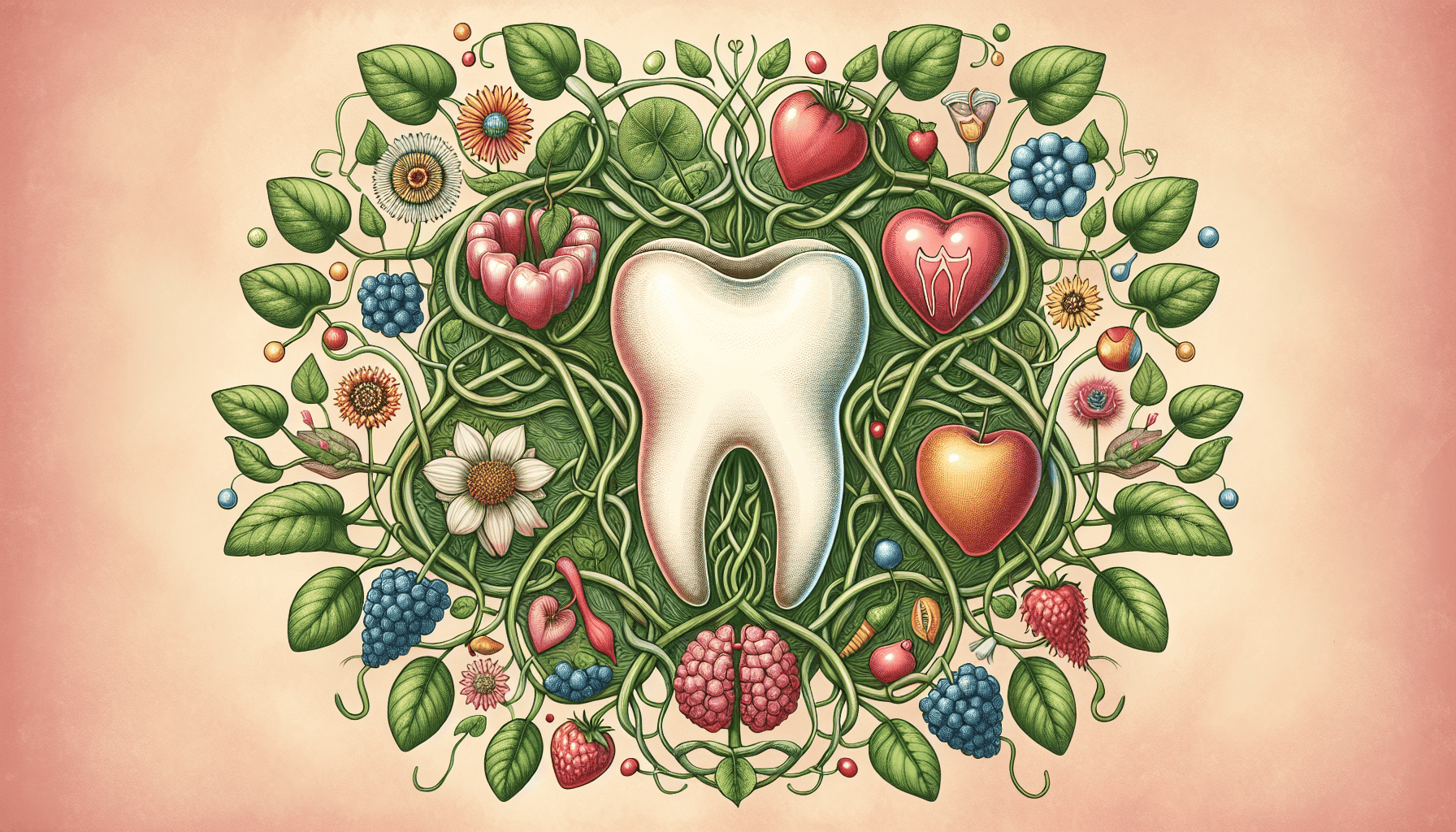
081c3a34 7180 4fa3 ae5e c7dfc51da8a3
The Tooth Meridian Chart serves as:
- An educational resource
- A diagnostic tool, enabling dental professionals to link oral health issues to overall wellness
- Offering a more comprehensive care plan
- A plan that follows biological dentistry principles
While dentistry often focuses on treating symptoms, the holistic perspective strives for balance, acknowledging that invisible energy meridians are pivotal in both health and disease processes, linking our teeth to vital body systems including the nervous, circulatory, and digestive systems. It’s a worldview where each tooth is a portal to the complexity of the human body, suggesting that our dental health can reflect and affect our state of being in profound ways.
Introduction
In the heart of biological dentistry lies a truth: oral health is a mirror of our overall health. While traditional dentistry may focus on the immediate treatment of symptoms, biological dentistry delves deeper, seeking to understand and treat the underlying connections between oral health and the rest of the body. It’s a comprehensive approach that aligns with a patient’s overall wellness, transforming the way we perceive and treat our dental needs.
What is the Teeth Meridian?
The Teeth Meridian is a concept that encompasses more than just the physical aspects of dental care. It is an intricate part of holistic dentistry where each tooth is believed to be connected to a particular organ or body system through energy pathways known as meridians. These pathways, grounded in traditional Chinese medicine, create a bridge between the state of one’s oral health and the health of their entire body.
Dentists versed in this approach use the meridian tooth chart as a guide to uncover deeper health challenges, positioning themselves as not only caregivers for the mouth but also as stewards of the body’s complex energy system. It’s a holistic view that transforms a simple toothache into a conversation about the interconnectedness of our body, opening a window to a broader understanding of health and wellness.
The Science Behind Meridian Theory
But how scientifically grounded is this theory of energy meridians? The meridian system, integral to the practice of acupuncture, is a cornerstone of traditional Chinese medicine, yet its existence and influence have been met with skepticism in the Western medical community due to limited empirical evidence. While meridian pathways are not visible like nerves or blood vessels, the notion that they can impact health remains compelling to those who practice alternative medicine, despite the criticism regarding the lack of scientific research supporting these methods.
Nonetheless, the meridian tooth chart persists as a key element in the world of holistic dentistry, revered not for its scientifically proven status but for its potential to illuminate the intricate links between our oral health and the rest of our body. It’s a concept that encourages a broader, more interconnected view of the body, challenging traditional dentistry to expand its horizons beyond teeth and gums alone.
How the Teeth Meridian Impacts Overall Health
The implications of the Teeth Meridian extend beyond the confines of holistic dentistry and into the realm of overall health. According to the meridian theory, issues in the mouth such as tooth decay, infections, or the presence of corrosive metals can obstruct the flow of meridian energy, potentially disturbing the health of connected organs. This perspective offers a unique lens through which to view dental problems, not as isolated incidents but as reflections of a larger health narrative within the body.
Holistic dentists, armed with the 12 meridian chart, approach oral health with the intent to treat not just the mouth but the whole person. By addressing dental problems with an awareness of their systemic connections, they offer a more comprehensive treatment that seeks to harmonize the entire body.
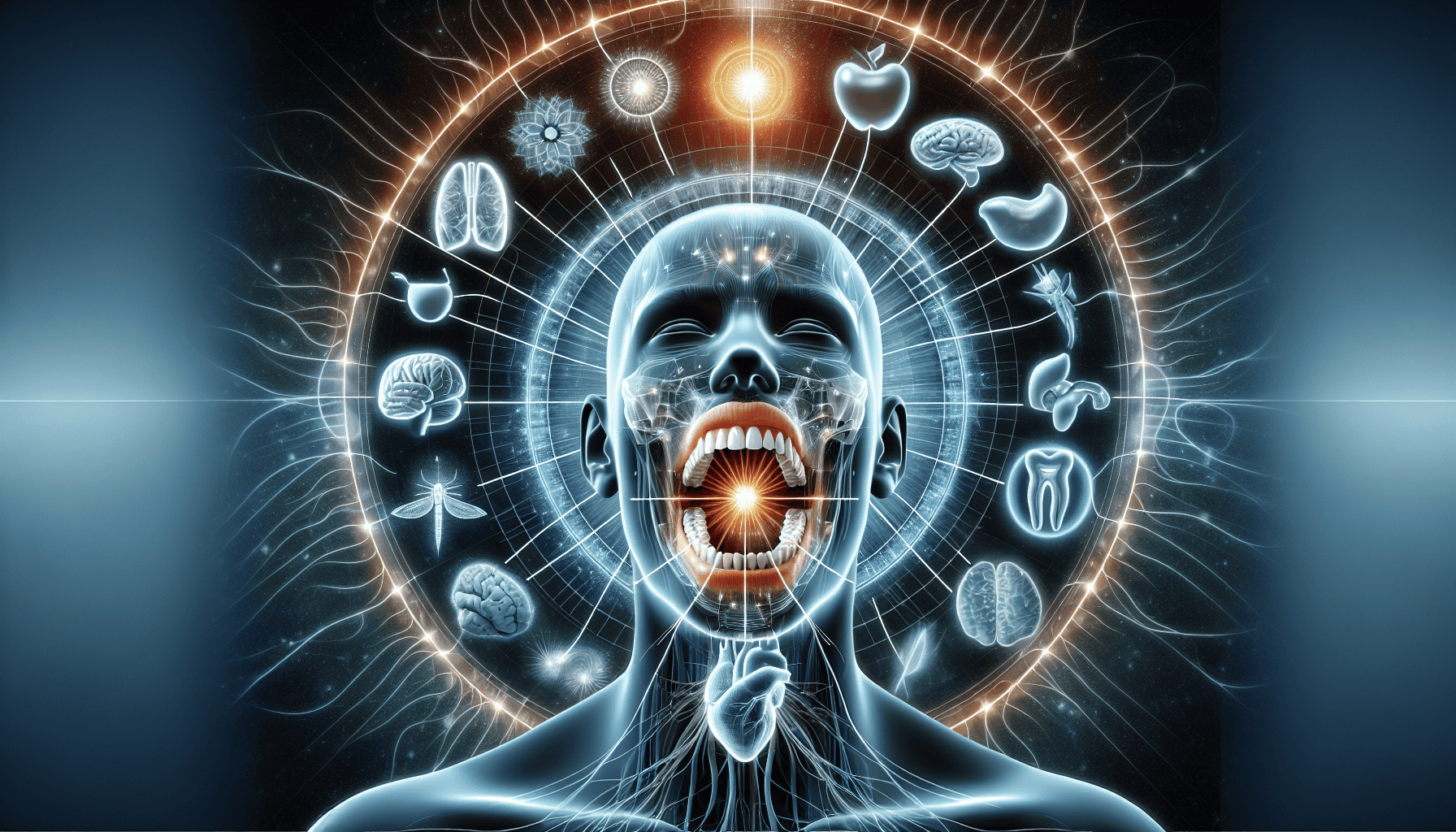
4e0764f1 697c 4865 8523 216445b23e49
Mouth-Body Connection
The concept of the mouth-body connection is gaining traction as research continually reveals the direct influence of oral health on physical health. Chronic dental issues such as gum disease and periodontal problems are now recognized as contributors to a host of chronic health conditions, including:
- cardiovascular disease
- diabetes
- respiratory infections
- pregnancy complications
- Alzheimer’s disease
The harmful bacteria thriving in an unhealthy oral environment release inflammatory substances that can enter the bloodstream and wreak havoc throughout the body.
Furthermore, conditions in other parts of the body can present themselves as dental issues through the meridian pathways, creating a two-way street where oral health and overall health are inextricably linked. This interconnectedness is why holistic dentists emphasize not only the treatment of dental ailments but also the nurturing of a healthy oral environment as a preventive measure for maintaining the well-being of the entire body.
Specific Tooth-Organ Connections
Diving deeper into the Teeth Meridian, we find specific links between individual teeth and organs that can be eye-opening. For instance, wisdom teeth are associated with the heart, and issues with these teeth could potentially reflect cardiac concerns. Similarly, the upper molars and lower premolars are linked to the stomach meridian, with their health possibly impacting digestive wellbeing.
The canine teeth’s connection to the liver and gallbladder meridians, and the premolars’ association with the large intestine, exemplify the specificity with which holistic dentists can assess patients’ general state of health through their oral examinations. It’s a detailed map that can guide both diagnosis and treatment, ensuring that dental care supports the health of related organs and systems.
Common Dental Problems and Their Meridian Links
In the world of holistic dentistry, common dental problems are not just a matter of cavities or gum disease; they are potential indicators of more profound health issues. Holistic dentists are adept at diagnosing and treating these conditions, but they also look for signs that these issues may be linked to other health problems via the meridian system. When examining issues like tooth decay, gum disease, or enamel degradation, they use the Tooth Meridian Chart as a compass to navigate the interconnected landscape of the body.
This integrative approach to dental care can be illuminating for patients. For example, the health of the upper and lower incisors is connected to the kidneys and bladder, suggesting that decay or infection in these teeth could be a signal of urinary system issues. It’s a holistic perspective that empowers patients to understand their dental problems within the broader context of their overall health.
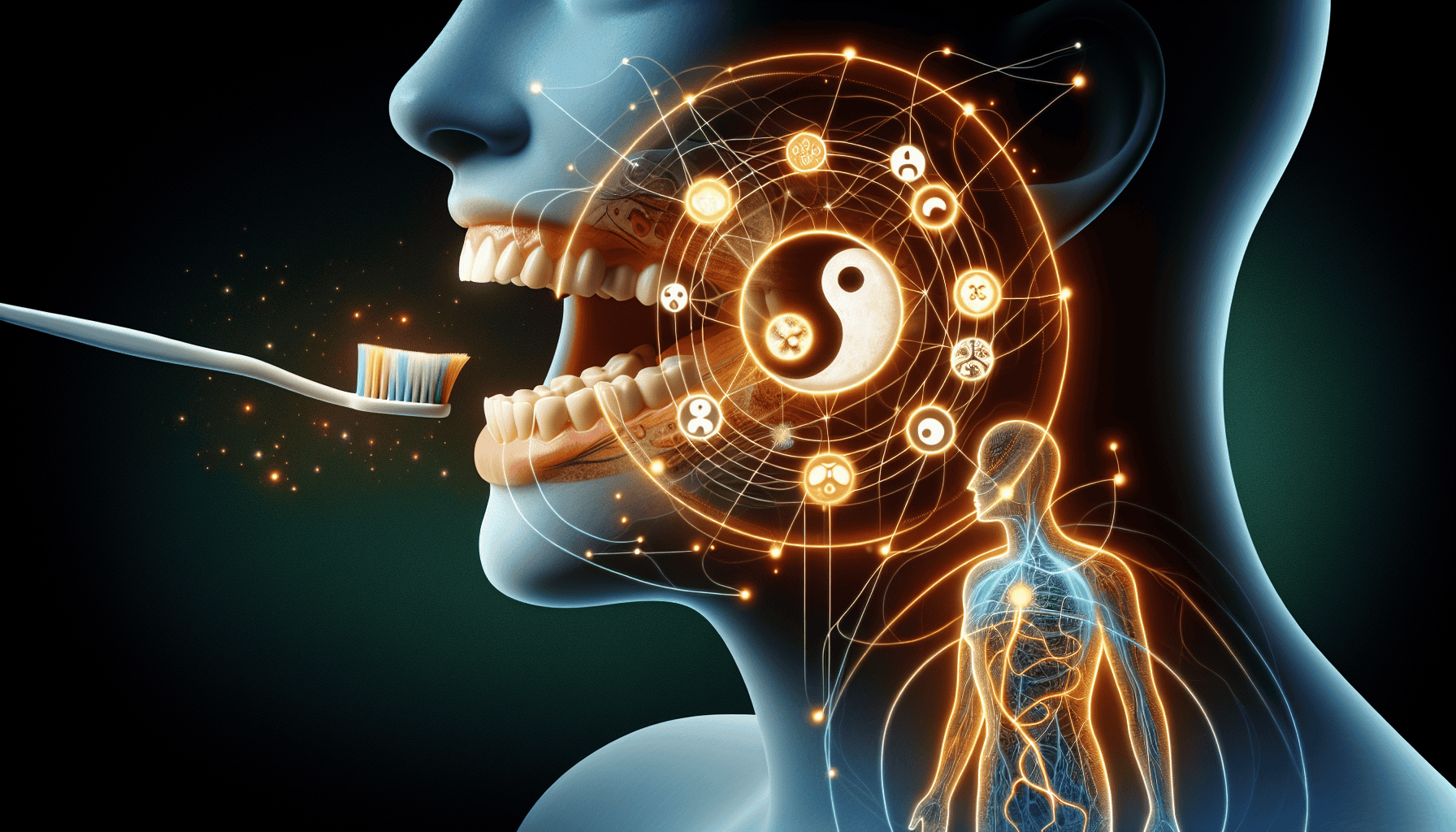
b8a7fced 4d10 4695 9c7b 4d20e3c4eb96
Tooth Decay and Organ Health
Tooth decay is often thought of as a localized oral health issue, but from a holistic viewpoint, it may also signify problems with specific organs. This connection highlights the importance of looking at dental issues through a wider health lens. Diets high in sugars and starches can contribute to both tooth decay and, consequently, to the deterioration of the health of the meridians associated with the affected teeth.
A deficiency in essential vitamins and minerals can have a direct impact on oral health and the vitality of the entire body. Holistic dentistry encourages a nutrient-rich diet for strong teeth and the wellness of the organs linked to them through the Teeth Meridian. Some essential vitamins and minerals for oral health include:
- Vitamin C
- Vitamin D
- Vitamin B12
- Calcium
- Phosphorus
By ensuring you have an adequate intake of these nutrients, you can support your oral health and overall well-being.
Gum Disease and Systemic Conditions
Gum disease, a pervasive dental problem, is increasingly recognized for its connections to systemic conditions. The inflammation from gum disease doesn’t confine itself to the mouth; it can exacerbate issues such as heart disease and diabetes, highlighting the critical role of oral health in the overall health equation. Holistic dentists understand that maintaining gum health is not just about preserving a beautiful smile, but also about safeguarding the body against broader health challenges.
The systemic inflammation stemming from chronic gum disease is a known culprit in worsening diseases throughout the body. It can even increase the likelihood of developing respiratory conditions like pneumonia, particularly in older adults, underscoring the need for a holistic approach to dental care.
Holistic Approaches to Addressing Teeth Meridian Issues
Holistic dentistry, sometimes referred to as unconventional dentistry, seeks to heal not just the teeth but the person as a whole, employing treatments that reflect a deep respect for the body’s natural processes. Holistic dentists prioritize the use of minimally invasive treatments and biocompatible materials, such as ceramic and zirconia, to minimize harm and encourage the body’s natural healing abilities. This philosophy extends to addressing the root causes of dental issues, aiming for lasting and effective healing rather than short-term fixes.
The materials and methods used in holistic dental care are chosen for their compatibility with the body’s natural state. For instance, holistic dentists may:
- Avoid using mercury, a substance found in traditional amalgam fillings, due to its potential health risks
- Opt for mercury-free composite fillings
- Use detoxification protocols
- Employ herbal remedies and acupuncture as complementary and alternative medicine to support overall wellness
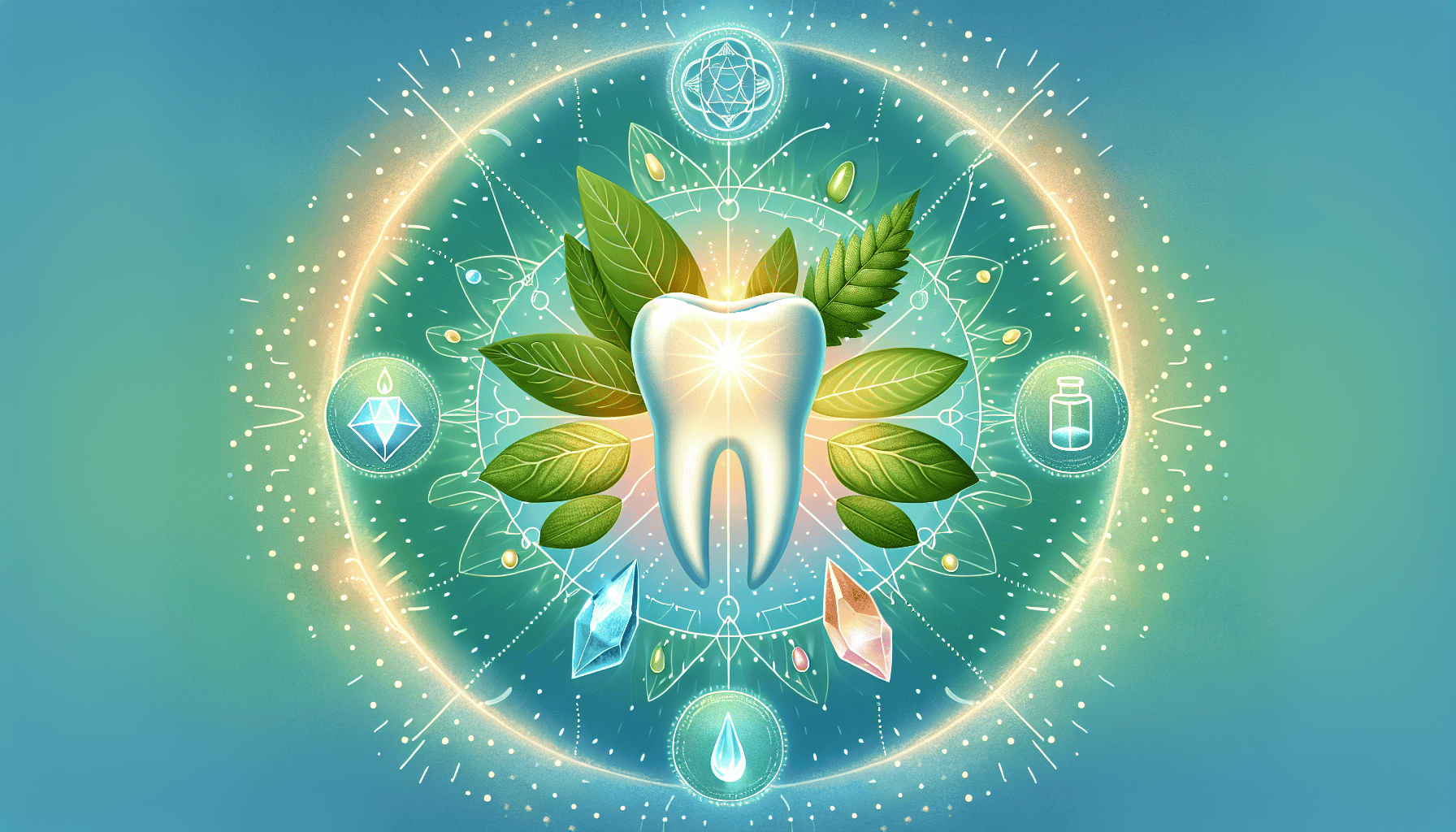
acec3fd0 f8c9 40eb 9329 abecc5506435
Ozone Therapy and Its Benefits
Ozone therapy stands out as a particularly effective holistic treatment, harnessing the natural power of ozone to combat infection and promote tissue healing. In the dental chair, ozone can be applied in various forms, including as a gas or liquid, to target and eliminate the harmful bacteria responsible for conditions like periodontal disease and tooth decay.
This therapy’s unique ability to disinfect and remineralize teeth provides a dual benefit, both eradicating pathogens and strengthening tooth enamel. The result is not just a healthier mouth but also an enhanced oxygen supply to the gums and teeth, contributing to improved oral and, potentially, overall health.
Nutritional Support for Dental Health
The adage “you are what you eat” holds particular truth in holistic dentistry. A diet rich in vitamins, minerals, and whole foods lays a robust foundation for both gum health and overall dental wellness. Nutrients like vitamin D, calcium, and phosphorus are essential for maintaining strong teeth and bones, making nutritional support a cornerstone of holistic dental health.
Holistic dentists advocate for a diet that minimizes sugary and acidic foods, which can lead to tooth decay and upset the delicate balance of the teeth meridian system. Instead, they recommend foods high in fiber, antioxidants, and water content to support a healthy oral environment and, consequently, a healthy body.
Integrating Meridian Theory into Your Dental Care Routine
Adopting the principles of the Teeth Meridian into daily life is about more than just regular dental check-ups; it’s about embracing a lifestyle that supports the flow of energy through the meridians connected to your teeth. Regular massage of acupuncture points related to dental health can be beneficial, as can the practice of Qi Gong or Tai Chi, which are known to enhance energy flow throughout the body, including the oral cavity.
By incorporating these practices into your routine, you foster not only your oral health but also your overall well-being, staying true to the holistic philosophy that your mouth is a gateway to the health of your entire body.
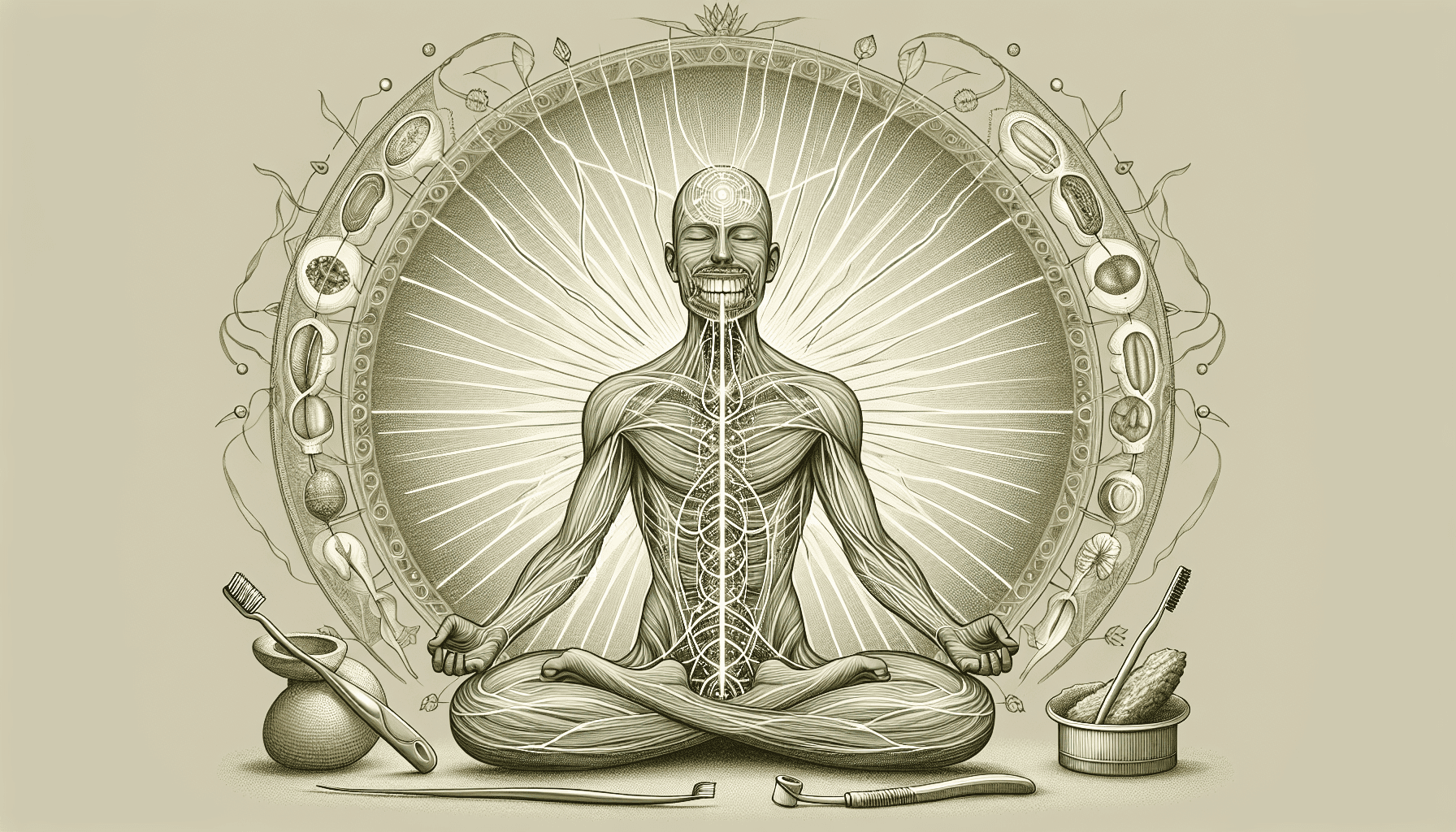
d9b9d3f1 fe97 43bc 986b 5956c68d0c43
Choosing a Holistic Dentist
Selecting a holistic dentist is an important step towards integrating the Teeth Meridian theory into your healthcare regimen. A holistic dentist is not just a practitioner of alternative dental practices; they are a guide in the journey towards overall wellness, using natural remedies and embracing the principles of holistic medicine. When searching for a holistic dentist, look for someone who offers a whole-body approach to dental care, including:
- the use of a meridian tooth chart during examinations to assess the broader implications of oral health issues
- the use of natural and non-toxic materials for dental treatments
- an emphasis on preventive care and education
- a focus on nutrition and its impact on oral health
- a consideration of the mind-body connection in dental health
By choosing a holistic dentist, you can ensure that your dental care aligns with your overall health goals, as holistic dentists offer treatments that focus on whole-body wellness. A licensed dentist with a holistic approach can provide you with the best of both worlds.
Appointments with a holistic dentist often involve education on the mouth-body connection and information on how to limit exposure to toxic substances. These dentists take the time to explore the interconnectedness of health and dental care, providing a comprehensive understanding that goes beyond what is typically offered by many conventional dentists, including traditional dentist practices.
Daily Practices for Optimal Oral Health
Maintaining optimal oral health on a daily basis involves simple yet effective practices that align with holistic principles. Here are some tips to follow:
- Drink plenty of water throughout the day to maintain a neutral pH balance in the mouth and wash away harmful substances.
- Rinse with natural mouthwash to reduce the toxic load.
- Use non-toxic toothpaste to support the body’s health and avoid harmful chemicals.
By following these practices, you can ensure the health of your teeth and gums while also promoting overall well-being.
Traditional oral hygiene practices such as saltwater gargling and tongue scraping, along with the ancient Ayurvedic technique of oil pulling, can significantly contribute to a clean and healthy oral environment. By incorporating these natural methods into your daily routine, you are not just taking care of your teeth, but you are also supporting your physical health and the harmonious flow of energy through your body’s meridian pathways.
Summary
As we close this exploration of the Teeth Meridian and its holistic implications, it becomes clear that dental health is intricately linked to our overall well-being. The Teeth Meridian system invites us to view oral health through a wider lens, considering how issues within the mouth can resonate throughout the body. By embracing a holistic approach to dentistry, we open ourselves to treatments and daily practices that honor the interconnectedness of our health. Remember, caring for your teeth is a vital part of nurturing your entire self.
Frequently Asked Questions
Holistic dentistry is an approach to dental care that considers the patient’s entire well-being, focusing on using biocompatible materials and minimizing invasive procedures while understanding the connections between oral health and the rest of the body.
Taking care of your dental health is crucial, as it can directly impact your overall health. Conditions like gum disease and tooth decay can lead to chronic health issues like heart disease, diabetes, and respiratory diseases by allowing bacteria to enter the bloodstream and causing inflammation.
Yes, including foods rich in vitamins D, C, and B12, calcium, and phosphorus in your diet can support dental health, while minimizing sugary and acidic foods. Eating foods high in fiber, antioxidants, and water content is also beneficial.
Ozone therapy is a holistic dental treatment that effectively removes bacteria, fights infection, remineralizes weakened enamel, and improves the oxygen supply to gums and teeth, contributing to improved oral and overall health. It uses ozone gas or liquid to disinfect and promote healing in the mouth.
To integrate the Teeth Meridian theory into your daily oral care routine, you can massage acupuncture points, practice Qi Gong or Tai Chi, use natural mouthwash and toothpaste, and incorporate traditional practices like saltwater gargling, tongue scraping, and oil pulling. This can support overall dental health and well-being.

 (301) 421 1996
(301) 421 1996 burtonsvillesmiles@gmail.com
burtonsvillesmiles@gmail.com